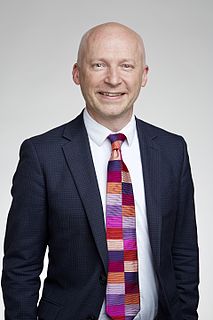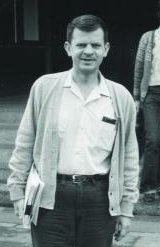A Quote by Ian Stewart
One of the biggest problems of mathematics is to explain to everyone else what it is all about. The technical trappings of the subject, its symbolism and formality, its baffling terminology, its apparent delight in lengthy calculations: these tend to obscure its real nature. A musician would be horrified if his art were to be summed up as "a lot of tadpoles drawn on a row of lines"; but that"s all that the untrained eye can see in a page of sheet music... In the same way, the symbolism of mathematics is merely its coded form, not its substance.
Quote Topics
About
Apparent
Art
Baffling
Biggest
Biggest Problem
Calculations
Delight
Drawn
Else
Everyone
Everyone Else
Explain
Eye
Form
Formality
His
Lengthy
Lines
Lot
Mathematics
Merely
Music
Musician
Nature
Obscure
Page
Problems
Real
Row
Same
See
Sheet
Sheet Music
Subject
Substance
Symbolism
Tadpoles
Technical
Tend
Terminology
Up
Way
Were
Would
Would Be
Related Quotes
Mystery is an inescapable ingredient of mathematics. Mathematics is full of unanswered questions, which far outnumber known theorems and results. It's the nature of mathematics to pose more problems than it can solve. Indeed, mathematics itself may be built on small islands of truth comprising the pieces of mathematics that can be validated by relatively short proofs. All else is speculation.
Mathematics, rightly viewed, possesses not only truth, but supreme beauty a beauty cold and austere, like that of sculpture, without appeal to any part of our weaker nature, without the georgeous trappings of painting or music, yet sublimely pure, and capable of a stern perfection such as only the greatest art can show. The true spirit of delight, the exaltation, the sense of being more than Man, which is the touchstone of the highest excellence, is to be found in mathematics as surely as in poetry.
Like a stool which needs three legs to be stable, mathematics education needs three components: good problems, with many of them being multi-step ones, a lot of technical skill, and then a broader view which contains the abstract nature of mathematics and proofs. One does not get all of these at once, but a good mathematics program has them as goals and makes incremental steps toward them at all levels.
I don't think that everyone should become a mathematician, but I do believe that many students don't give mathematics a real chance. I did poorly in math for a couple of years in middle school; I was just not interested in thinking about it. I can see that without being excited mathematics can look pointless and cold. The beauty of mathematics only shows itself to more patient followers.
[Winning the White House was an achievement], but as an African-American, [Barack Obama], I think the symbolism is in how he conducted himself. The symbolism was in - and this sounds really, really small, but it's actually big for African-Americans - the symbolism was not in being an embarrassment, but to being a figure that folks were actually proud of.
The broader the chess player you are, the easier it is to be competitive, and the same seems to be true of mathematics - if you can find links between different branches of mathematics, it can help you resolve problems. In both mathematics and chess, you study existing theory and use that to go forward.
As I considered the matter carefully it gradually came to light that all those matters only were referred to mathematics in which order and measurements are investigated, and that it makes no difference whether it be in numbers, figures, stars, sounds or any other object that the question of measurement arises. I saw consequently that there must be some general science to explain that element as a whole which gives rise to problems about order and measurement, restricted as these are to no special subject matter. This, I perceived was called 'universal mathematics'.
Mathematics has two faces: it is the rigorous science of Euclid, but it is also something else. Mathematics presented in the Euclidean way appears as a systematic, deductive science; but mathematics in the making appears as an experimental, inductive science. Both aspects are as old as the science of mathematics itself.
Mathematical thinking is not the same as doing mathematics - at least not as mathematics is typically presented in our school system. School math typically focuses on learning procedures to solve highly stereotyped problems. Professional mathematicians think a certain way to solve real problems, problems that can arise from the everyday world, or from science, or from within mathematics itself. The key to success in school math is to learn to think inside-the-box. In contrast, a key feature of mathematical thinking is thinking outside-the-box - a valuable ability in today's world.

































